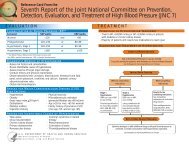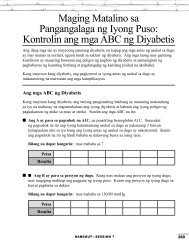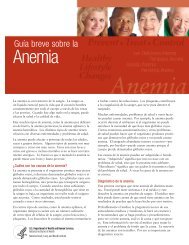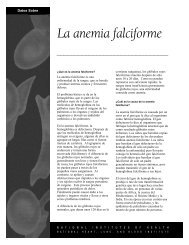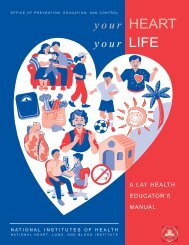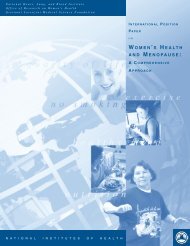HeartsNParks Community Mobilization Guide - National Heart, Lung ...
HeartsNParks Community Mobilization Guide - National Heart, Lung ...
HeartsNParks Community Mobilization Guide - National Heart, Lung ...
You also want an ePaper? Increase the reach of your titles
YUMPU automatically turns print PDFs into web optimized ePapers that Google loves.
To The Healthy <strong>Heart</strong> I.Q. Quiz<br />
1 True. High blood pressure, smoking, and<br />
high blood cholesterol are the three most<br />
important risk factors for heart disease. On<br />
the average, each one doubles your chance of<br />
developing heart disease. So, a person who<br />
has all three of the risk factors is eight times<br />
more likely to develop heart disease than<br />
someone who has none. Obesity increases the<br />
likelihood of developing high blood<br />
cholesterol and high blood pressure, which<br />
increase your risk of heart disease. Physical<br />
inactivity increases your risk of heart attack.<br />
Regular exercise and good nutrition are<br />
essential to reducing high blood pressure,<br />
high blood cholesterol, and overweight.<br />
People who exercise are also more likely to<br />
cut down or stop smoking.<br />
2 True. A person with high blood pressure or<br />
high blood cholesterol may feel fine and look<br />
great; there are often no signs that anything is<br />
wrong until a stroke or heart attack occurs.<br />
To find out if you have high blood pressure<br />
or high blood cholesterol, you should be<br />
tested by a doctor, nurse, or other health<br />
professional.<br />
3 True. A blood pressure of 140/90 mm Hg or<br />
greater is generally classified as high blood<br />
pressure. However, blood pressures that fall<br />
below 140/90 mm Hg can sometimes be a<br />
problem. If the diastolic pressure, the second<br />
or lower number, is between 85-89, a person<br />
is at an increased risk for heart disease or<br />
stroke and should have his/her blood pressure<br />
checked at least once a year by a health<br />
professional. The higher your blood pressure,<br />
the greater your risk for developing heart<br />
disease or stroke. Controlling high blood<br />
pressure reduces your risk.<br />
4 False. High blood pressure is more common<br />
in blacks than whites. It affects 29 out of<br />
66 High Blood Pressure<br />
every 100 black adults compared to 26 out of<br />
every 100 white adults. Also, with aging,<br />
high blood pressure is generally more severe<br />
among blacks than among whites, and therefore<br />
causes more strokes, heart disease, and<br />
kidney failure.<br />
5 True. Recent studies show that lifestyle<br />
changes can help keep blood pressure levels<br />
normal even into advanced age, and are<br />
important in treating and preventing high<br />
blood pressure. Limit high-salt foods, which<br />
include many snack items such as potato<br />
chips, salted pretzels, and salted crackers;<br />
processed foods such as canned soups; and<br />
condiments such as ketchup and soy sauce.<br />
Also, it is extremely important to take blood<br />
pressure medication if prescribed by your<br />
doctor, to make sure your blood pressure<br />
stays under control.<br />
6 False. A total blood cholesterol of under 200<br />
mg/dL is desirable and usually puts you at a<br />
lower risk for heart disease. A blood cholesterol<br />
level of 240 mg/dL or above is high and<br />
increases your risk of heart disease. If your<br />
cholesterol level is high, your doctor will<br />
want to check your levels of LDL-cholesterol<br />
(“bad” cholesterol) and HDL-cholesterol<br />
(“good” cholesterol). A HIGH level of LDLcholesterol<br />
increases your risk for heart<br />
disease, as does a LOW level of HDLcholesterol.<br />
A cholesterol level of 200-230<br />
mg/dL is considered borderline-high and<br />
usually increases your risk for heart disease.<br />
If your cholesterol is borderline-high, you<br />
should speak to your doctor to see if additional<br />
cholesterol tests are needed. All adults 20<br />
years of age or older should have their blood<br />
cholesterol level checked at least once every<br />
5 years.<br />
7 False. Reducing the amount of cholesterol<br />
in your diet is important; however, eating



